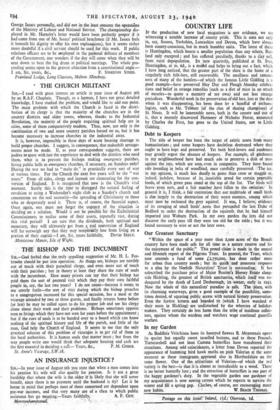THE CHURCH MILITANT
Sta,—I read with great interest an article in your issue of August 9th by an R.A.F. Chaplain. Though, as a layman, I have not great detailed knowledge, I have studied the problem, and would like to add one point. The main problem with which the Church is faced in the distri- bution of its clergy is that the majority of the churches are in the country districts and older towns, whereas, thanks to the Industrial Revolution, the majority of the people requiring spiritual help are in cities, some of them comparatively modern. Thus, now, not only is the combination of two and more country parishes forced on us, but it has become necessary to increase churches in the industrial areas.
It is, however, impossible in these days of acute housing shortage to build proper churches. I suggest, in consequence, that makeshift arrange- ments must be made. If, as your correspondent suggests, there are padres to spare with just the experience to deal with the- districts who need them, what is to prevent the bishops making emergency parishes, hiring public halls as emergency churches, if necessary, on Sundays only? During the war we had to " make do." in practically every sort of way at various times. For the Church the next few years will be the " war years.." From all sides, clergy and laymen are clamouring for the con- version of England. It is recognised that now is the Church's vital moment. Surely this is the time to ' disregard the natural feeling of revulsion at using a Wednesday's night club as a Sunday's church and concentrate on the real necessity—the spreading of Christianity to those who so desperately need it. There is, of course, the financial aspect. Once ,again, one must not forget the urgency of the situation :n deciding on a solution. Would it not be possible for the Ecclesiastical Commissioners to realise some of their assets, reputedly vast, during this vital period? I am sure that the dividends, both spiritual and monetary, they will ultimately get from .a teal conversion of England will far outweigh any that they may tempOrarily lose from living on a portion of their capital.—I am, Sir, yours faithfully, DAVID SEELY. Mottistone Manor, Isle of Wight.


























 Previous page
Previous page